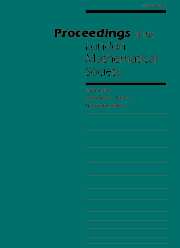Crossref Citations
This article has been cited by the following publications. This list is generated based on data provided by
Crossref.
Brattka, Vasco
2003.
STACS 2003.
Vol. 2607,
Issue. ,
p.
391.
Stoltenberg-Hansen, Viggo
and
Tucker, John V.
2003.
Computable and Continuous Partial Homomorphisms on Metric Partial Algebras.
Bulletin of Symbolic Logic,
Vol. 9,
Issue. 3,
p.
299.
Cotogno, Paolo
2003.
Hypercomputation and the Physical Church‐Turing Thesis.
The British Journal for the Philosophy of Science,
Vol. 54,
Issue. 2,
p.
181.
Zhong, Ning
and
Weihrauch, Klaus
2003.
Computability theory of generalized functions.
Journal of the ACM,
Vol. 50,
Issue. 4,
p.
469.
Kreinovich, Vladik
and
Longpré, Luc
2004.
Fast quantum algorithms for handling probabilistic and interval uncertainty.
Mathematical Logic Quarterly,
Vol. 50,
Issue. 4-5,
p.
405.
Graça, Daniel S.
Campagnolo, Manuel L.
and
Buescu, Jorge
2005.
New Computational Paradigms.
Vol. 3526,
Issue. ,
p.
169.
Weihrauch, Klaus
and
Zhong, Ning
2005.
Computing the solution of the Korteweg-de Vries equation with arbitrary precision on Turing machines.
Theoretical Computer Science,
Vol. 332,
Issue. 1-3,
p.
337.
Beggs, E.J.
and
Tucker, J.V.
2006.
Embedding infinitely parallel computation in Newtonian kinematics.
Applied Mathematics and Computation,
Vol. 178,
Issue. 1,
p.
25.
Weihrauch, Klaus
and
Zhong, Ning
2006.
Theory and Applications of Models of Computation.
Vol. 3959,
Issue. ,
p.
783.
Weihrauch, Klaus
and
Zhong, Ning
2006.
Computing Schrödinger propagators on Type-2 Turing machines.
Journal of Complexity,
Vol. 22,
Issue. 6,
p.
918.
Trott, Michael
2006.
The Mathematica GuideBook for Numerics.
p.
1.
Beggs, Edwin J.
and
Tucker, John V.
2007.
Can Newtonian systems, bounded in space, time, mass and energy compute all functions?.
Theoretical Computer Science,
Vol. 371,
Issue. 1-2,
p.
4.
Beggs, E.J
and
Tucker, J.V
2007.
Experimental computation of real numbers by Newtonian machines.
Proceedings of the Royal Society A: Mathematical, Physical and Engineering Sciences,
Vol. 463,
Issue. 2082,
p.
1541.
Weihrauch, Klaus
and
Zhong, Ning
2007.
Computable analysis of the abstract Cauchy problem in a Banach space and its applications I.
Mathematical Logic Quarterly,
Vol. 53,
Issue. 4-5,
p.
511.
Case, John
2007.
Mathematical Problems from Applied Logic II.
Vol. 5,
Issue. ,
p.
53.
Weihrauch, Klaus
and
Zhong, Ning
2007.
Computable Analysis of the Abstract Cauchy Problem in a Banach Space and Its Applications (I).
Electronic Notes in Theoretical Computer Science,
Vol. 167,
Issue. ,
p.
33.
Brattka, Vasco
Hertling, Peter
and
Weihrauch, Klaus
2008.
New Computational Paradigms.
p.
425.
Bournez, Olivier
and
Campagnolo, Manuel L.
2008.
New Computational Paradigms.
p.
383.
Beggs, Edwin
Costa, José Félix
Loff, Bruno
and
Tucker, John V
2008.
Computational complexity with experiments as oracles.
Proceedings of the Royal Society A: Mathematical, Physical and Engineering Sciences,
Vol. 464,
Issue. 2098,
p.
2777.
Graça, Daniel S.
Buescu, Jorge
and
Campagnolo, Manuel L.
2008.
Boundedness of the Domain of Definition is Undecidable for Polynomial ODEs.
Electronic Notes in Theoretical Computer Science,
Vol. 202,
Issue. ,
p.
49.


